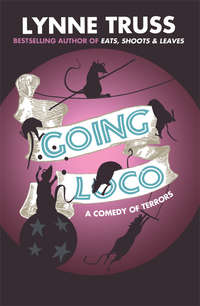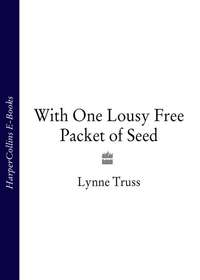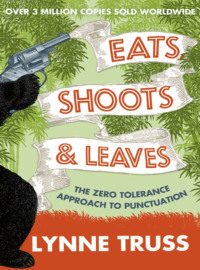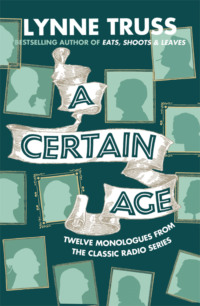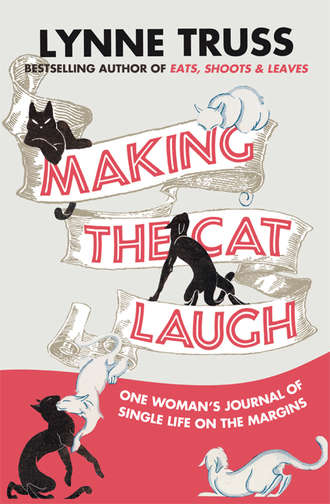
Полная версия
Making the Cat Laugh

LYNNE TRUSS
Making the Cat Laugh
One Woman’s Journal of Single Life on the Margins

Contents
Cover
Title Page
Introduction
Single Bananas
News Stories That Captured My Imagination
The Single Woman Considers Going Out but Doesn’t Fancy the Hassle
The Trials of Celibacy Explored with Surprising Frankness
The Single Woman Stays at Home and Goes Quietly Mad
The Only Event of Any Importance That Ever Happened to Me
Reflections on Culture
Crackers Already
The Arnolds Feign Death Until the Wagners, Sensing Awkwardness, are Compelled to Leave …
Acknowledgements
About the Author
By the same author
Copyright
About the Publisher
No Valentines from the cats again. Sometimes I wonder whether they are working as hard at this relationship as I am. Few other pets, I imagine, were lucky enough to find their Valentine’s day breakfasts laid out on heart-shaped trays, with the words ‘From Guess Who’ artfully arranged in Kitbits around the edge. But what do I get in return? Not even a single rose. Not even a ‘Charming thought, dear. Must rush.’ Just the usual unceremonious leap through the cat-flap; the usual glimpse of the flourished furry backside, with its ‘Eat my shorts’ connotation. Wearily I sweep up the Kitbits with a dustpan and brush, and try to remember whether King Lear was talking about pets when he coined the phrase about the serpent’s tooth.
Of course, the world would be a distinctly different place if cats suddenly comprehended the concept of give and take – if every time you struggled home with a hundredweight of cat food and said accusingly, ‘This is all for you, you know,’ the kitties accordingly hung their heads and felt embarrassed. Imagine the scene on the garden wall: ‘Honestly, guys, I’d love to come out. But the old lady gave me Sheba this morning, and I kind of feel obligated to stay home.’ ‘She gave you Sheba?’ ‘Yeah. But don’t go on about it. I feel bad enough that I can never remember to wipe my feet when I come in from the garden. When I think of how much she does for me …’ (breaks down in sobs).
Instead, one takes one’s thanks in other ways. For example, take the Valentine’s present I bought them: a new cat-nip toy, shaped like a stick of dynamite. This has gone down gratifyingly well, even though the joke misfired slightly. You see, I had fancied the idea of a cat streaking through doorways with a stick of dynamite between its jaws, looking as though it had heroically dived into a threatened mine-shaft and recovered the explosive just in time to save countless lives. In this Lassie Come Home fantasy, however, I was disappointed. Instead, cat number one reacted to the dynamite by drooling an alarming quantity of gooey stuff all over it (as though producing ectoplasm), and then hugging it to his chest and trying to kick it to death with his back paws.
Yet all is not lost. If the cat chooses to reject the heroic image, I can still make the best of it. With a few subtle adjustments to my original plan, I can now play a highly amusing game with the other cat which involves shouting, ‘Quick! Take cover! Buster’s got a stick of dynamite, and we’ll all be blown sky-high!’ And I dive behind the sofa.
I suppose all this gratitude stuff has been brought to mind because I recently purchased a very expensive cat-accessory, which has somehow failed to elicit huzzahs of appreciation. In fact, it has been completely cold-shouldered. Called a ‘cat’s cradle’, it is a special fleecy-covered cat-hammock which hooks on to a radiator. The cat is suspended in a cocoon of warmth. A brilliant invention, you might think. Any rational cat would jump straight into it. Too stupid to appreciate the full glory of my gift, however, my own cats sleep underneath it (as though it shelters them from rain), and I begin to lose patience.
‘Come on, kitties,’ I trilled (at first). ‘Mmmm,’ I rubbed my cheek on the fleecy stuff. ‘Isn’t this lovely? Wouldn’t this make you feel like a – well, er, like an Eastern potentate, or a genie on a magic carpet, or a very fortunate cat having a nice lie-down suspended from a radiator?’ However, I stopped this approach after a week of failure. Now I pull on my thick gardening gloves, grab a wriggling cat by the waist, and hold it firmly on its new bed for about forty-five seconds until it breaks away.
I am reminded of a rather inadequate thing that men sometimes say to women, in an attempt to reassure them. The woman says, ‘I never know if you love me, Jonathan,’ and the man replies smoothly, ‘Well, I’m here, aren’t I?’ The sub-text to this corny evasion (which fools nobody) is a very interesting cheat – it suggests that, should the slightest thing be wrong with this man’s affections, he would of course push off immediately into the wintry night, rather than spend another minute compromising his integrity at the nice fireside with cups of tea.
Having a cat, I find, makes you susceptible to this line of reasoning – perhaps because it is your only direct line of consolation. ‘I wonder if he loves me,’ you think occasionally (perhaps as you search the doormat in vain for Valentines with paw-prints on them). And then you gently lift the can-opener from its velvet cushion in the soundproofed kitchen, and with a loud ker-chunk-chunk a cat comes cannoning through the cat-flap, and skids backwards across the lino on its bum. And you think cheerfully, ‘Well, of course he does. I mean, he’s here, isn’t he?’

Having now worked at home for just over three weeks, I realize I have broken the longest-ever-period-in-my-life-away-from-the-office barrier, thus confirming that I am definitely not on holiday. So I felt this would be a good time to give any would-be freelancers the benefits of my experience.
1. Advantages:
a) The main advantage of working at home is that you get to find out what cats really do all day. This means they can never again expect you to fall for their ‘heavens-what-a-hard-day-I’ve-had’ routine.
b) Also important, you rapidly disabuse yourself of the notion that a novel waits to be written about the fascinating diurnal rhythms of a South London postal district.
c) There is a lot of excitement generated by the arrival of the postman, who delivers lots of press releases and books. Sometimes he chooses not to put a package through the specially enlarged letterbox, but thoughtfully leaves a note telling you to trek three miles to the sorting office to pick it up. Glad of the fresh air, you give thanks for the opportunity to spend a whole morning on a fool’s errand. Luckily, the postman never delivers cheques, otherwise you would have to waste a lot of time making boring trips to the bank as well.
d) Where you used to miss good bits on Start the Week because you had crashed the car into a BMW on Hyde Park Corner, now you can listen to the whole programme from underneath the duvet. Then you can hear Money Box, Morning Story and the Daily Service. A good programme to get out of bed to is The World at One. Within a week, the metaphorical lark gives up waiting for you, and rises unaccompanied.
e) Where you used to do the shopping once a month, and buy 10lb bags of frozen rissoles, now you learn that you can visit the same corner-shop five times in a single day before the proprietor gets suspicious and starts following you around.
2. Disadvantages:
a) Cats don’t talk very much, and if you ask one to ‘copy-taste’ a piece you have written, he will probably sit on it with his back to you.
b) Whenever serious work is contemplated, the words ‘Time for a little something’ spring immediately to mind; ditto the words ‘There’s no point carrying on when you’re tired, is there?’, and ‘They can probably wait another day for this, actually.’
c) When you read your pieces in print, the key sentence has always been cut, and the best joke ruined by a misprint. But when you run along to the newsagent’s to amend all remaining copies, the shopkeeper – recognizing you from 1(e) – is unsympathetic. ‘Why don’t you get yourself a proper job?’ he says. ‘The trouble with you is you’ve too much time on your hands.’
Single Bananas
An old friend of mine, who five years ago migrated to the country with her husband to propagate children and rear a garden, recently sent me a card which I didn’t know quite how to take. ‘Wishing you all good luck’, she wrote, ‘on your chosen path.’ I sat looking at it with my fingers in my mouth. What did she mean, exactly, by this notion of the ‘chosen path’? I assumed she meant it kindly, but it made me feel suddenly exposed and distant. Hey, where did everybody go? Supposing that she imagined herself on a path radically divergent from mine, I instantly pictured myself labouring alone up a narrow, steep, dusty, brambly trail with a determined look on my face, as though illustrating a modern-day parable about the grim sacrifices of feminism.
So vivid was this picture, in fact, that I could feel the stinging nettles brushing against my legs. It was awful. I felt thirsty; my head swam; the sun scorched my shoulders. Looking down, I observed my friend ambling happily in the sunshine on a broad level path with a pram and husband, while small apple-cheeked children ran off to right and left, frolicking with lambs. I would have watched for longer, but a bloke called Bunyan came along and told me to hop it.
But I was definitely confused by the notion of the chosen path, and dwelt on it for days. Did I choose this, then? And if so, why couldn’t I remember doing it? Hadn’t I always thought, rather naïvely, that there was still time to make these decisions about wife-and-motherhood in the future – that the crossroads were just over the horizon? But it turns out that the last exit was miles back, and I am a person whose chosen path speaks for itself. The hardest part was realizing I can never be a teenage tennis phenomenon. How on earth did I let things drift so badly?
For some reason I thought of the careers mistress at school – perhaps because she represents the single point in my life when I recognized a T-junction and made a definite choice. She wanted us all to be nurses, you see; and I refused. Brainy sixth-formers would queue at the careers office with fancy ideas about Oxford and Cambridge and archaeology, and come out again 15 seconds later, waving nursing application forms and looking baffled. ‘You have to have A-levels to be a nurse now, you know, Miss Hoity-Toity!’ she would bark after them, twitching.
At my age, women are supposed to hear the loud ticking of a biological clock, but I think I must have bought the wrong battery for mine. The only time I experienced the classic symptoms was when I desperately wanted a car. It was weird. If I spotted another woman driving a Peugeot 205, I would burst into tears. In the end, friends tactfully stopped mentioning their cars in my presence (‘My Volvo did such a funny thing the other day – oh Lynne, how awful. I didn’t see you’). And there was that one shameful occasion when I lurked outside a supermarket half-considering snatching a Metro. ‘What a lovely bonnet you’ve got,’ I whispered, fingering it lightly. But then a woman shouted ‘Oi!’, so I picked up my string bag and scarpered.
Now I realize that what I want is a book. So much do I want to give birth to a book that I experience ‘false alarms’ – when I think I am ‘with book’, but am not really. Once a month I phone up my agent and say, ‘It’s happening!’ And she says, ‘How marvellous!’ And then I have to ring again a week later and say, ‘Bad news,’ and she says, ‘Never mind, conception is a mysterious thing.’ I suddenly realize that a book would be a comfort in my old age, and I try to ignore the argument that there are already too many books in the world competing for the available shelf-space. Mine, of course, will be a poor fatherless mite, but I shall love it all the more for that.
Perhaps the image of the paths and crossroads is just the wrong one. Perhaps I did always know where I wanted to go, but just walked backwards with my eyes closed, pretending there was no act of will involved. Because I do recall from early youth that while other children pleaded with their mums for miniature bridal outfits and little dolls that went wee-wees, I was campaigning for a brick-built Wendy House in the garden where I could lock the door and sit at an enormous typewriter. My only imaginary friends were phantom insurance collectors, a person from Porlock and the printer’s boy.
My idea of a Wendy House was a rather grandiose one, I suppose. It involved guttering and utilities and a mantelpiece where I could put the rent money, not to mention trouble with the drains. I remember when a little friend told me she had acquired a Wendy House, and I was wild with envy. But when I went to see it, it was just a canvas job with painted-on windows. Fancy telling a gullible kid that this was a Wendy House. Sometimes I wonder what happened when she eventually uncovered the deception. Probably she married somebody with a big house and had lots of kids in double-quick time, to establish a sense of security. In which case, I wish her all good luck on her chosen path.
The prevailing notion of the lone woman traveller seems to have been fixed about a century ago, and entails such heart-stopping intrepidity and pluck that there is not much in our banal modern lives to touch it. I mean, compared with the achievement of striding across the Andes armed only with a pocket bible and a big stick, the modern-day purchase of an air ticket to Los Angeles is going to look rather paltry, isn’t it? And compared with Amelia Earhart flying solo across the Atlantic in a rattling crate with nothing but a soup Thermos and a star-map, the modern woman’s stout-hearted endurance of an eleven-hour scheduled flight (complete with movies and drinks) is emphatically nothing to write home about.
Intrepidity is relative, however. To me, the acme of being brave is catching a bus in central London after 9pm, or enduring a whole instalment of Just a Minute on Radio 4. So it was only natural that when I booked my single ticket to LA before Christmas I was so transported by my own pluckiness that for a moment I thought I smelled quinine and hartshorn in the air. Sod Amelia Earhart’s soup, I thought; this feels great. How brave and adventurous I am, to travel alone! I nearly phoned up Maria Aitken to suggest she make a documentary.
This was the first thing I learnt about solitary travel, by the way: that the habit of tiresome (and bogus) self-congratulation starts at the ticket desk and never wears off. ‘Hey, I made it!’ you say proudly, as you step off the plane, having done nothing more heroic during the flight than stumble to the loo a couple of times. ‘Wow, I collected my luggage from the carousel! I found my hotel! I had some M&Ms from the minibar! I turned on the TV and it worked!’ This exclamatory tone is a bit relentless, I’m afraid. ‘I hired a car! I looked someone up in the telephone directory! I ate a bagel in Santa Barbara!’ And so on.
Travelling à deux does not encompass this splendid sense of perpetual infantile achievement; I don’t know why. Travelling à deux, in fact, is generally a much more sober and grownup affair, with precision map-reading not only its greatest measure of success but also (alas) its highest goal.
‘Nicely map-read, dear,’ says the driver, calmly applying the handbrake.
‘Well, thanks very much. It got a bit tricky around Nuneaton, but I think I kept my head.’
‘We didn’t get lost at all, did we?’
‘No, we didn’t.’
The advantages to travelling alone are many, as I discovered. For one thing, you can listen to old Beach Boys hits on the car radio without your passenger huffily twiddling with FM to find something else. Secondly, you can take art galleries at your own pace (at a brisk roller-skating speed, if preferred) without feeling guilty. Thirdly, you can browse in shops without first devising an hour’s alternative entertainment for your companion (who will otherwise stand next to the door looking helpless, like a tethered puppy). And fourthly, you can choose a route for your journey without your companion suddenly spotting a scenic wiggly detour just a few miles short of your destination.
The main disadvantage – as I also discovered – is that when travelling on fast roads at night it is impossible to drive and navigate at the same time. Something to do with the number of hands, I think. Consequently, on a simple trip across town to Pasadena, you can get so deeply lost on the freeway system that you think the night will swallow you up (just like poor old Amelia Earhart) and that your cats at home will die of broken hearts waiting for your return. Such terrors are feeble, no doubt, compared with those of the stout Victorian lady wandering lost in the deserts of Arabia, describing huge ragged circles in the shifting sands. But I can assure you that the cry ‘I don’t want to go to Glendale!’ represents the nearest I have ever got to a nervous breakdown.
Perhaps map-reading really is what holidays are about – strenuously mastering streetplans, so that one can always find the route back to the bus station. I admit that maps obsess me; as a founder member of Cartomaniacs Anonymous, I resent and refute the theory that women are genetically incapable of reading maps (although I rather like the notion of dangling a copy of the London A–Z over a pregnant woman, to determine the gender of the unborn child. If the foetus shrugs and turns its back, murmuring ‘Ach, I’m sure you’ll find it,’ it is probably a boy.)
So no wonder my night of terror in Los Angeles made such an impression on me: every time I braked abruptly at the sight of yet another freeway approach, all my maps slid off the passenger seat on to the floor. Moreover, when I reached inside the glove compartment for hartshorn, there was never any there. Alone and Disoriented Without a Smelling Bottle in Glendale. Perhaps I should make the call to Maria Aitken, after all.

An old chum, newly spliced, recently invited me to dinner in his new marital home. Ordinarily I would have said yes automatically, but this time I heard myself imposing conditions.
‘Is it a nice house?’ I asked.
‘Yes, very nice.’
‘And you and your new wife are really happy there?’
‘Yes, we are.’
‘With a nice well-organized kitchen, and a big fireplace, and a patio for barbecues, and a little room suitable for Baby?’
‘Yeah, sort of.’
‘Well, in that case the answer’s no.’
There was an awkward pause.
‘Did you say no?’
‘That’s right,’ I said briskly. ‘Not in a million years. Let’s meet at Leicester Square for a pizza or something instead. Then we can eat and talk just the same, but afterwards I can come home feeling quite all right and not mysteriously depressed because your home life is so lovely. All right?’
If he was surprised by this outburst, so was I. I had no idea I felt so strongly. All I knew was that sometimes, after a delightful evening spent with perfect hosts in a full, groaning family house, a single person spends the next few days dumb with misery, hating everybody, and bursting into unexpected tears during heart-warming re-runs of Flipper. I confessed my ‘Not in a million years’ speech to a friend, who said she understood, and who mentioned that at least I had been assertive without being aggressive. Which made me bloody annoyed. ‘What’s the point of that?’ I yelled. Damn. Next time, I shall shout ‘Sod your fancy house with its bloody patio and its baby room, you make me sick, you people.’ Because there are times when a sub-text simply won’t do.
The alternative strategies to an outright No Thanks – though possibly better etiquette in the strict sense – are too wearisome to contemplate. For example, you can accept the invitation, and then half an hour before arrival phone up with a fabricated story about a last-minute mercy-dash (‘I’m so sorry, but if I don’t deliver this jar of rollmop herrings to the Foreign Office in the next hour, we could find ourselves at war with Finland!’). But is this less rude than explaining your true feelings? I think not. Worst of all, surely, is to agree to come, turn up punctually, make perfect-guest ‘Ooh lovely’ noises at the wallpaper, and then sever your wrist quietly in their nice big kitchen while pretending to help with the puddings.
Don’t get me wrong. Things get better for single people every day. Oh yes. How cheerful to reflect, for example, that Sainsburys now sells ‘Single Bananas’ in a special bag. But we are not the norm, despite our bananas. We are seen as something akin to the rogue animals in wildlife films, the ones that are tolerated by the herd but don’t fit in, and are photographed sulking hundreds of yards off, snuffling in long white grass. When lone dolphins turn up in British harbours (clearly enjoying a walloping good time eating fresh salmon and frolicking with the boats), the British public invariably feels sorry for them, and worries about finding them a suitable mate. It is the same benevolent but mistaken instinct that makes married people invite you to their new house.
What nobody appreciates, of course, is that the poor old dolphin fields invitations all day, through his ultrasonic mind-waves. ‘Come to dinner, we haven’t seen you in ages,’ he hears from a happy nuclear dolphin family five miles out to sea. ‘Bugger,’ thinks the dolphin, wishing he had remembered to switch on his answering machine. How can he say he moved five miles (and risked having to swim with New Age poets in wet-suits) just to escape all this? Treading water for a minute, he programs his super-brain to run through the available strategies, and instantly feels doubly depressed. Pizzas in Leicester Square is not a viable option for a dolphin; and the rollmop herrings routine cuts no ice whatever in a marine context.
He is caught all ways actually, because he can’t be assertive or aggressive, since neither is in his nature. And he always finds Flipper depressing. What a bind. So in the end, he agrees to visit, swims miles, has a marvellous time, adores the kids, applauds the bold choice of murky green throughout, gets home late, and flops out exhausted with a smile on his face. And then, for about a week later, he mopes miserably in the water, and everyone says it must be because he misses the company of other dolphins.
Perhaps it is a phase you go through, this ugly envy stuff. I hope so, certainly. I know one woman who is perfectly all right most of the time, but who bursts into tears every time she gets a wedding invitation, so that we have to rush out and have a pizza at Leicester Square, where we talk bravely about single bananas. Edna Ferber said that single life, like drowning, is a delightful sensation once you cease to struggle – but is this comforting, or isn’t it? The analogy isn’t bad, certainly: your whole life unfolds before your eyes, and you entertain strange dreamy consoling thoughts such as ‘I shall never have to wash my hair again, anyway.’ Meanwhile, however, you can’t help wishing that those nice married people on the bank would stop chucking you lifebelts, so that you can just get on with it.


